Not so ‘Perfect a blunder’
Gamini Gunawardane comments on an article by Dr
Dayan Jayatilleke published in an English daily
The purpose of my exercise is views to provide some, may be relevant
or may be even considered irrelevant, different dimensions to look at
issues from the point of view of a onetime Law enforcement officer/
investigator.
Dr Jayatillake, inter alia, has stated as follows: “Surely, lessons
could have been drawn from the conduct of Sirimavo Bandaranaike and
Felix Dias Bandaranaike in the face of the 1962 coup attempt? Those
leaders smashed the coup attempt, but did not seek to try those involved
under the military regulations despite the fact those regulations
existed and the accused were serving officers of high rank.” Now let us
look at the reality.
|
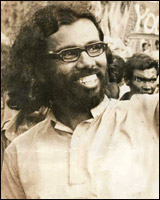
Rohana Wijeweera |
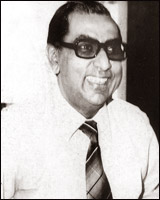
Felix Dias Bandaranaike |
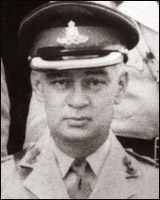
F. C. de Saram
|
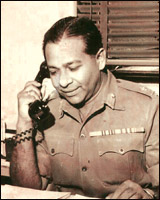
Richard Udugama |
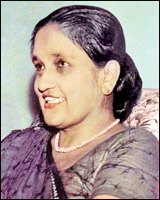
Sirimavo Bandaranaike |
This incident took place 48 years ago, may be just around the time
that both the present Defence secretary, the Army Commander and the
Commander of the Military Police were just born or were mere toddlers.
True, one need not necessarily live through history to draw from this
experience.
But the fact is that the subject of ‘learning from history’ though
taught in American Universities nowadays, I do not know, subject to
correction, if this particular case is taught or discussed as a learning
experience in the Sri Lanka Military Staff College, Batalanda or at the
Military Academies of Kandawela or Diyatalawa or elsewhere, or even at
the Police Higher Training Institute.
Usually, the personalities who figured in such events, if living, are
invited to the course, to discuss the pros and cons of their experience
and answer the questions of the students.
I know that a copy of the court case record and several volumes of
investigation files of this case are lying in the shelves of the CID
Library. But I do not think to date anyone including my humble self have
ever peeped into these volumes, nor has any academic researcher or any
other professional.
So much for our professionalism and academic research in this
country. Hence, it is no surprise that no lessons were drawn from the
1962 experience, in the present case.
Investigations
Another factor that was an advantage for Mrs. Bandaranaike was that,
the ‘62 Coup investigation was done under the able direction and
supervision of that brilliant, though eccentric and arrogant young
Justice Minister, Felix Dias Bandaranaike, the nephew of SWRD and son of
Justice R.F. Dias. (So much for nepotism and family bandyism).
The investigation itself was handled by a brilliant team of
investigators of the CID which included Inspector Tyrrel Gunatilleke who
later recounted all this to me. It is very unlikely that the Rajapaksa
Government had such an advantage to direct the present case which
appears to me to be far more complicated, both politically and
otherwise.
Neither can one expect such standards of investigations in the
present situation where all relevant organisations have been emasculated
of all power and authority through progressive politizsation since 1972
by successive governments, to such an extent that Vice Chancellors of
universities found it necessary to exhort us on whom to vote for.
The final effect of this process was seen within ten years, in the
Parliament bomb case in 1987 where the President, Prime Minister and
Internal Security Minister, were targeted among other top
Parliamentarians within the Parliament building itself. An MP and a
Parliament employee died in the attack while Internal Security Minister
was critically injured. Though the suspect was traced and arrested, the
case failed in courts due to sheer incompetence of the CID.
Presidential candidate
It was perhaps the culmination of the effect of politicization
following the ‘cleansing’ of that organisation after the ‘77 elections.
In fact, during the run up to the ‘77 election an angry JRJ had
threatened to bring the Fourth Floor to down to the ground floor when he
was elected! I think he accomplished it though not literally, as shown
by the Parliament bomb case.
Another point of contrast between the ‘62 case and the present case
is that almost all the Military and Police officers were not high
profile characters except perhaps Col. F. C. de Saram who was a well
known cricketer.
They were in no way comparable with Sarath Fonseka, who was fresh
from an outstanding military victory who was admired as the greatest of
war heroes who received worldwide publicity, hyped also by the
government too, for political reasons.
He was also the popular defeated Presidential candidate, where his
supporters were peeved and shocked that he lost soundly.
He was highly controversial in that he had threatened to expose his
colleagues and the Government leaders on alleged war crimes, to the
International community. Naturally, the international community had his
interest at heart.
There was also his alleged concession to the TNA demands, in the run
up to the election.
To add to the confusion, he was suspected of corruption in the matter
of purchase of some military equipment.
There was further, his controversial visit to the US. Furthermore,
there was the allegation that the Government had suspected his motives
and ill-treated him during the last days of his military career. Hence,
his case was highly politicized. Thus, touching him was indeed high
explosive!
On the other hand, in the ‘62 case the public sympathy was for Mrs.
B, the poor widow who had just assumed power and the country itself was
shocked at this unheard of attempt to overthrow the Government. The
people were bewildered. Unlike in the present case the wives of these
officers did not appear before cameras to garner sympathy for their
husbands.
Buddhist monk
Even in the 1966 Coup case there was no real ballyhoo about the
arrest of Ven Henpitgedera Gnanaseeha Thera who was a respected Buddhist
monk and even the then Army Commander, Richard Udugama who were both
thrown into remand prison. No awkward questions were asked of the
Government whether that was way to treat a respected monk and a popular
Army Commander etc., though it was believed that there was much more
media freedom then than now!
Information revolution had not taken place by 1962. There were no TV
cameras, hand phone cameras, television, Internet, twitters or blogs and
websites to report news round the world over instantly. Today, whoever
got on the TV screens and electronic media first, had the day. The
arrests in 1962 were done in different places, most of them past
midnight. Most of them, were not violent, being members of a ceremonial
Army, Navy and Air Force, not battle tested. So till morning, no body
really knew what really was happening.
Thus, situation-wise the ‘62 case was ‘child’s play compared to the
present case. True, nevertheless the given circumstances were cleverly
managed. But as could be seen from the facts given above, this case was
far too complicated and dicy by any standards. It was certainly a
difficult situation to manage. I do not envy those officers. They could
not afford to fail. It is not always that one is pitted into such
situations.
Military law
Yet, the court case of ‘62 coup case was reversed by the Privy
Council on the grounds that the suspects had been charged and convicted
of offences that did not exist in the law books, at time of the
commission of the said offences, i.e. cannot operate with retrospective
effect.
This was again the result, of the over smart thinking of the over
confident and adventurous ‘bright spark’ FDB, the Justice Minister, who
had his way at that time.
Then the statement that the suspects in the coup case were not
arrested under the military law though they were of high rank. Again,
the two cases are not similar in that, in the ‘62 case there were senior
Police officers as well as civilians such as Douglas Liyanage, Civil
Servant, who turned out to be the first accused. So obviously, military
law could not apply in the ‘62 case.
That apart, I do not know whether a suspect in a case had the
discretion of deciding as to, what law under which he would submit to
his arrest and under what law he wouldn’t. May be this point would be
thrashed out in courts when the legality of his arrest would be gone
into. The only case that I know of is the ‘Main Case’ against the 1971
JVP insurrection where, as far as I could recall, Rohana Wijeweera
refused to plead before the CJC because he held the view that this was a
court set up by the Government which did not have legitimacy. I believe,
his position was that the Government was illegitimate, against which he
took up arms to overthrow. Hence, had no legitimate right to try him. He
was nevertheless tried, convicted sentenced and duly jailed.
Legal provisions
The question of which law to apply in such situations throws a very
interesting challenge to enforcement officers, particularly in a high
profile case with political implications which we normally refer to as
‘a tricky case’. In such situations the enforcement officers usually
address the question as to, under what law to conduct their
investigation. In the instant case they would have had a choice of
deciding among three kinds of legal provisions. Viz., (a) Criminal Law
(Penal Code) (b) Emergency Regulations and (c) Military law. Usually the
criterion is, which law will yield the highest advantage or leeway, in
addition to being fair in the circumstances. They appear to have opted
to act under the military law because it gave them the best
investigative and detention advantage.
When the CID was called upon to investigate an allegation of
misappropriation of a large stock of smuggled wristwatches by Negombo
Police H.Q. station where the suspects included the entire chain of
command including the ASP himself in 1972, the top brass of the CID sat
in session to determine the best investigational strategy.
The CID then was unpopular among the uniformed Police as much as
among the society at large as this organisation came down hard on all
offenders both in uniform and other and was no respecter of persons. It
also had behind them Dodampe Mudalali and an accused in the CWE case who
jumped to their death from a Fourth Floor window, which brought in
notoriety. How the arrests could be done with minimal addition to this
unpopularity was also a major issue. The CID had several options;
namely, to act under, a) Penal code, b) Customs Ordinance or c) under
the Police Disciplinary Code. After a lengthy discussion, it was decided
to act on neither. The decision was to request the DIG (Mr. A.C. Dep) to
issue an administrative order to the relevant officers to report to CID
Director on Special Duty to assist him in an investigation into the
allegation of misappropriation of smuggled wristwatches, which was being
conducted by the CID for the DIG. The Police officers were required to
take orders from CID Director regarding their movements thereafter. That
eliminated the question of their detention.
The SP Kelaniya was asked to look after the interests of his officers
under investigation, by being present at the interrogations. This was
despite our having the information that he too was given one wristwatch
by the ASP as a souvenir. One could imagine the embarrassment of the SP
when the ASP was under interrogation! The investigation was smooth
sailing after this decision. All accused were finally convicted under
the Police Disciplinary Code, where Snr. State Attorney Sarath N. Silva
was the prosecuting officer.
We had to face similar challenge when in 1976 I had to arrest late
Lalith Athulathmudli in connection with a case of conspiracy and
attempted murder. Here was a formidable suspect, A Harvard LLM and a
former lecturer in law at the University of Singapore who was
threatening to become the next Justice Minister. The SLFP Government was
sure to loose at the hustings in ‘77. I timed his arrest for a Sunday
morning when his chambers would be closed and when the man could
expected be alone at home, so there was least room for a political fuss.
Athulathmudali was an arrogant man thoroughly conversant in the law.
He threw the book at us, we threw the same book back at him, as we had
done a lot of homework, with the Director Prosecution, Ranjith
Abeysuriya. For some time it was like a game of chess. Finally he
submitted himself to arrest as he ‘knew the law’ and his limits.
AG’s Department
In both these cases as well as in many other, we then had the luxury
of a lot of time to do our home work and map out our strategy in
consultation with the AG’s Department. There were the luminaries like
Noel Tittawella and later Ranjith Abeysuriya, Kenneth Seneviratne and
down the line, the likes of Sunil de Silva, D.S. Wijesinghe and then Snr.
State Attorney Sarath N Silva himself, readily available to consult.
Tyrrel Gunathilake told me that Noel Tittawella had told him that when
tricky matters as these were discussed with his guru, L.B.T. Premaratne
A.G., he would say after considering all the options: “That is what the
law says. Now let us see what prudence would say”.
In the present case we do not know whether the enforcement officers
had the luxury of consulting mature legal opinion before proceeding to
effect the arrest within the time frame available, it being such a
‘tricky case’ with so much implications.
Then comes the much asked question, “is this the way to treat a
national hero?”. A difficult question to answer. Also, a highly
politically charged question. A counter question. Could there have been
another way of doing it in the given circumstances? We do not know how
rushed the enforcement officers were to effect the arrest. Could they
have delayed this action? We do not have adequate inside information of
the circumstances. Assuming that the facts revealed up to that time was
compulsive, they probably had to decide how much more opportunity was
the subject to be allowed to do further damage.
They would have had to decide on the timing, place of arrest and the
manner of arrest. The suspect officer was the former Army Commander and
the Chief of Defence Staff, an aggressive personality whose reaction to
an attempt to arrest would be unpredictable.
Arresting officers
He could react violently, knowing his personality and he could even
resist arrest. Hence a possible strategy was, to take him by surprise
leaving him little opportunity to fall back on any counter plan that he
had in mind. Any softness could be interpreted to be a weakness he could
exploit.
The arrest also had to be accomplished quickly to avoid
complications, hand phone photographing or video cameras etc. Thus, they
may have had to rush through the process. The total drama may have
looked shoddy or in Dr Jayatillake’s words ‘clumsy’, judged from the
highest standards. However, I wouldn’t envy the plight of the arresting
officers in the given circumstances. Thus, a certain degree of
collateral political damage was probably inevitable in the
circumstances. The risk had to be taken if the arrest was a must, at
that point of time.
The writer is retired senior DIG |



